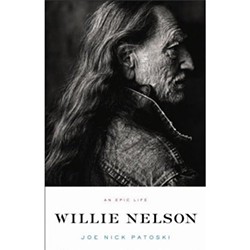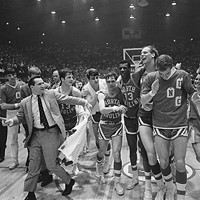The red-headed wild-ass
New bio of Willie Nelson shines
Anyone who knows the culture of small Southern burgs can tell you about the deep vein of ornery iconoclasm that runs beneath those towns' surface of Christian piety. Some cultural scholars say that the region's wild, contrarian streak is probably part of the reason Southerners have clung to their masks of superficial amiability for so long. After all, stern Sunday lectures certainly haven't dimmed the South's weakness for hard-living, free-thinking wild-asses. Some days, the only recourse for the "respectable" Southerner is to put on a happy face and hope others don't notice the drunken uncle sleeping it off on the back porch.
Singer-songwriter Willie Nelson, who celebrates his 75th birthday this month, is one Southerner who, over the years, has embarrassed many a tightly wound, churchgoing acquaintance while on his way to becoming an American legend. Now there's a big fat biography of Willie (available this Monday, April 21) in which the singer's long, complicated career as an extraordinarily talented rebel is recounted at a leisurely, steady pace by author Joe Patoski.
One of the fascinating aspects of Nelson's career is the way his lifelong iconoclasm meshed so well with the rise of an American counterculture in the late-60s/early-70s. The success of Patoski's mammoth Nelson biography comes from the author's grasp of Willie's attraction to, and acceptance by, hordes of fans who wouldn't have been caught dead listening to country music a few years before the 1975 release of the Red Headed Stranger album. That record finally brought Willie Nelson the success as a performer that he had craved for over 20 years.
After a successful career as a songwriter in Nashville, Nelson realized he would never be able to record his own songs the way he wanted them to sound in the country music capital. For Nelson, writing timeless songs for other artists ("Crazy" for Patsy Cline; "Night Life" for Ray Price; "Funny How Time Slips Away" for Billy Walker) was lucrative but ultimately unsatisfying, and so he left Nashville for Austin, Texas, where he re-created himself into the American icon we know today.
The move to Austin wasn't the first time Nelson roamed to find freedom. Born in Texas in 1933, he played in a band in high school and worked as a radio deejay. Soon he was roaming here and there around Texas, looking for just the right combination of playing music and spinning records that would lead to an opportunity to record his own music. At age 23, Nelson took off for Vancouver, Wash., where his mother lived, and launched a new musical career which, although moderately successful, still didn't bring in enough money. So Nelson moved on to Nashville, where he became known as one of that city's finest songwriters. His equal reputation as a renowned and difficult wild-ass led some of the country music establishment to hold Nelson at arm's length, and thus the semi-retirement to Austin.
In the Texas capital, Nelson found inspiration, came out of his half-hearted retirement, and began to play his own synthesis of traditional country, Western swing, rock and jazz. At the same time, he began to take his health seriously, started a running regimen, ate better, and switched from whiskey to pot. In the process, he saved his own life and launched his most productive period.
By the time of Red Headed Stranger's 1975 release, Nelson had built up a new following made up of hippies who had turned on to country music and, alternately, country fans who were, let's say, "loosening up" their own lifestyles. The album was a career-making smash, led to the whole "Outlaw Country" movement (largely based in Texas along with Waylon Jennings and others), and gave Nelson the leeway to become more active in political and environmental causes. Now, nearly as many people know Willie Nelson as the guy who started the Farm Aid concerts, or began a bio-diesel fuel company, or acted in several movies, or got into big-time trouble with the IRS, or sent millions of dollars in concert receipts to South Pacific tsunami victims, or even got a Ben & Jerry brand of ice cream named after him, as know him for his stellar songwriting.
Author Joe Patoski is a very thorough, precise reporter who understands Nelson's motivations and his importance as an American icon. There is, unfortunately, a bit of a "note-dumping" feel to parts of the book, particularly in the story of Willie's early days, but when he's writing about the important turning points, Patoski shines. Interviews of more than 100 people are put to good use as the author weaves them into a three-dimensional portrait of one of the most interesting American musicians, and musical careers, of the past 50 years.
Willie Nelson: An Epic Life by Joe Nick Patoski
Little Brown, 576 pages, $27.99
Latest in Books
Calendar
-

NEW WINDOW GALLERY-Pat Rhea-ACRYLIC PAINTINGS-April 05-30 2024 VALDESE, NC 28690 @ New Window Gallery/Play It Again Records
- Through April 30, 12 p.m.
-
Derek Hough - Symphony Of Dance @ Ovens Auditorium
-

"Blood Residue Analysis of Paleoamerican Stone Tools in the Carolinas" @ Native American Studies Center
- Fri., April 26, 12-1 p.m.
-

ARTS RENAISSANCE, a GALA supporting the ARTS in South Carolina @ the Columbia Museum of ART
-
 The Piano Guys @ Ovens Auditorium
The Piano Guys @ Ovens Auditorium
-
The death of CAST 5
What really happened to Charlotte's beloved experimental theater company?
-
Jessica Moss Makes the Gantt Center a Safe Zone for Local Artists 2
Flipping the script
-
Charlotte ink 7
Behind the pain with a trio of the Queen City's finest tattoo artists











